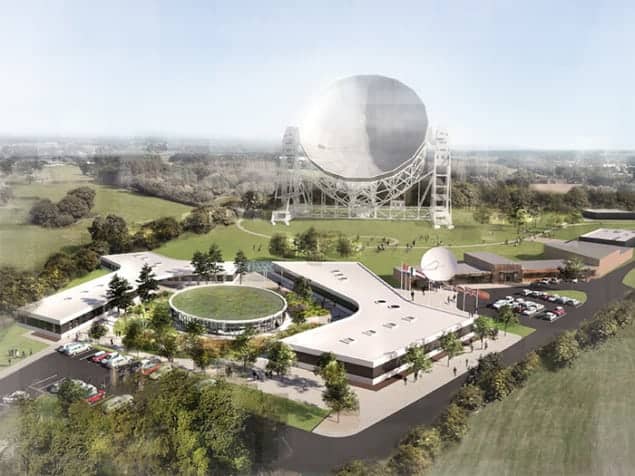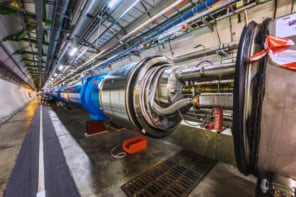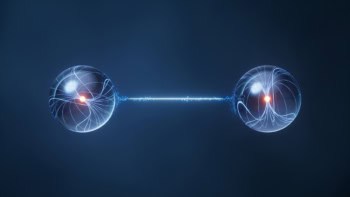
Member countries building the world’s largest radio telescope – the Square Kilometre Array (SKA) – have chosen the Jodrell Bank site near Manchester in the UK to host the observatory’s headquarters. The decision has delighted UK astronomers but is a huge disappointment to their Italian counterparts, who say that their Padua-based bid was backed by the project’s site-selection panel.
The design for the multi-billion-euro SKA calls for thousands of dishes and millions of dipole antennas with a total collecting area of a square kilometre. Together, these devices will allow astronomers to observe the universe as it was just a few hundred-million years after the Big Bang, when the first stars and galaxies started to form. The SKA will also look for the gravitational waves predicted by general relativity.
Following a bitter contest to host the telescope itself, which resulted in the project being split between southern Africa and Australia/New Zealand in 2012, the process to select a site for the headquarters got under way last year. Both Italy and the UK submitted bids, with the former proposing to host the headquarters in a renovated 14th-century castle in Padua and the latter to expand the existing temporary headquarters at Jodrell Bank in Cheshire, home of the Lovell Telescope.
Competing sites
A panel set up by the SKA’s 11 member countries – Australia, Canada, China, Germany, India, Italy, New Zealand, South Africa, Sweden, the Netherlands and the UK – to review the two bids submitted a report in February, in which it recommended the Italian proposal. The panel said that both bids fulfilled nine pre-established criteria, but judged the Padua site to be stronger in five of them – being larger, housing more astronomers, and providing easier access to services such as restaurants and hotels. Nevertheless, at a meeting on 6 March, members did not declare a winner but instead asked both teams to prepare a second round of bids – much to the chagrin of the Italians.
In reviewing the updated bids, the advisory panel was not asked to recommend one proposal over another, but instead to establish whether either of the two bids had been improved in any of the nine categories and what risks were involved in choosing either of the two proposals. Like the panel’s earlier report, this second review has not been made public, but has been seen by physicsworld.com.
The Italian bid was again considered superior against five of the criteria, but this time the British proposal was judged better in one category, that of financial support. The UK pledged £200m (about €270m) towards the €1bn needed for the first stage of the SKA – construction of which is due to start in 2018 – while Italy promised €193m in national funding and another potential €200m from the European Union.
It is that promise of additional funds, among other things, which appears to have swayed the SKA members at a meeting on 29 April at Jodrell Bank, where at least 75% of those members voting in a secret ballot put a cross beside the British bid. Philip Diamond, director-general of the SKA Organisation, says that “each member looked at the panel’s advice and then assigned weights to the various criteria as they saw fit”. He adds that the British funds have been “fully committed by ministers all the way up to the prime minister” and remarks that the upcoming general election in the UK should not change the situation. “I believe there is bipartisan support for the SKA,” he says.
Disappointed decision
Martin Barstow, president of the Royal Astronomical Society, says he is delighted with the decision, adding that it will mean that “SKA scientists will be able to take advantage of the wealth of expertise Britain has in radio astronomy.” But Giovanni Bignami, president of Italy’s National Institute of Astrophysics and co-ordinator of the Italian bid, says he is very disappointed with the outcome. “It would have been much easier to accept if the advisory panel had reached the same verdict,” he says. Bignami adds that the Italian government is now considering its options, including possibly leaving the project. He thinks that it will be a tough task explaining the defeat to Italian prime minister Matteo Renzi, who wrote three letters in support of the bid.



